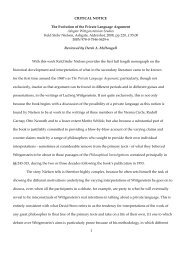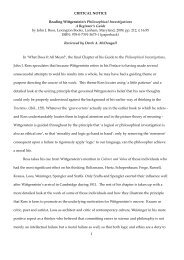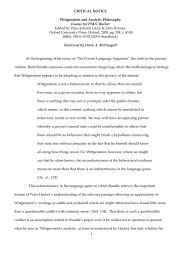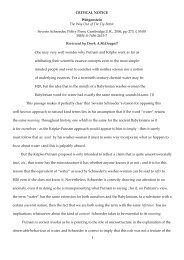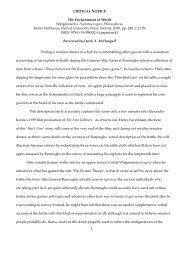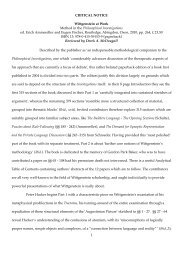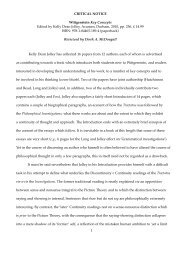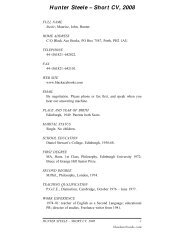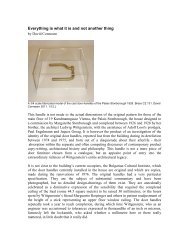Wittgenstein's Philosophical Investigations A Critical Guide
Wittgenstein's Philosophical Investigations A Critical Guide
Wittgenstein's Philosophical Investigations A Critical Guide
You also want an ePaper? Increase the reach of your titles
YUMPU automatically turns print PDFs into web optimized ePapers that Google loves.
providing non-trivial necessary and sufficient conditions for its application, a point confirmed by the<br />
suggestion that when we do ordinarily obey the rule in some particular case by applying a term to<br />
some appropriate collection of features, there is no satisfactory ‘interpretation’.<br />
But this is an extraordinary conclusion to draw, and one totally unwarranted, because what<br />
is meant in the text by giving a rule an ‘interpretation’ is that we (mistakenly) treat our intention of<br />
following it as a way of making a stab in the dark, ‘as if each [interpretation] contented us at least<br />
for a moment, until we thought of yet another standing behind it’ (§ 201). That is why Wittgenstein<br />
suggests that we restrict the term ‘interpretation’ to the substitution of one expression of the rule for<br />
another, because the idea that our following a rule should appear to us to be a matter of making a stab<br />
in the dark, is the consequence (when doing philosophy) of our being caught between two misleading<br />
pictures, one which tells us on the one hand that the future development of the expression is in some<br />
way already present in grasping the use, yet is not really present ( § 197), and one which tells us that<br />
every course of action we propose can be made out to accord with the rule (§ 201).<br />
Forster elaborates on Wittgenstein’s anti-Platonic stance in the pages which follow, finding<br />
that in relation to our psychological concepts, the continuing demand for a single common feature<br />
and non-trivial essential necessary and sufficient conditions for a term’s application contributes to<br />
the philosophical error of dualism (Ibid., 80). This problem Wittgenstein confronts, according to<br />
Forster, with the response that psychological concepts ‘refer to patterns of physical behaviour<br />
(albeit in a distinctive “criterial”, or assertibility-conditioned, way) ’. For those who see Wittgenstein<br />
wedded to the more sophisticated concept of expressive behaviour, and therefore in this context to<br />
the grammar of truth-conditions, this will seem unduly regressive, a return to ideas which have surely<br />
been superseded in the secondary literature. The notion, which Forster classifies as straightforwardly<br />
behaviourist if nevertheless controversial as applied to Wittgenstein (Ibid., Footnote 46) that ‘the<br />
psychological state or process in question can be found at the level of the physical behaviour’ (Ibid.)<br />
whilst in this way a retrograde step, is nevertheless found by Forster to be a virtue of Wittgenstein’s<br />
thought: his special type of reductionism does not conform to the usual reductive model which does<br />
18



